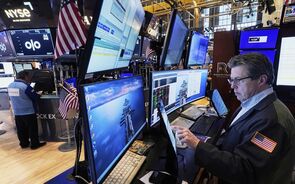Detroit wants its bailout too
5 mensagens
|Página 1 de 1
Caro Mozwhack, eu percebi, mas tb quis explanar que a nossa ironia pode tornar-se realidade. Quem sabe até onde vão estes senhores. Em agosto do ano passado se eu dissesse que a Bear Strens, Lehman e Merril Lynck iam parar a esta situação tb era ironia ou loucura. 
Um abraço e bons negócios.
Artur Cintra
Artur Cintra
- Mensagens: 3157
- Registado: 17/7/2006 16:09
- Localização: Cascais
Faz sentido?!Fico na duvida, porque quando ganham aos milhões não dão nada a ninguem, mas quando estão a perder já querem ajuda dos contribuintes.
Concordo é que se existe para uns, tem de existir para outros. Qualquer dia temos os casinos a pedir tb, porque devido á falta de liquidez houve quebra de receitas. Está tudo doido.
Está tudo doido.
Concordo é que se existe para uns, tem de existir para outros. Qualquer dia temos os casinos a pedir tb, porque devido á falta de liquidez houve quebra de receitas.
Um abraço e bons negócios.
Artur Cintra
Artur Cintra
- Mensagens: 3157
- Registado: 17/7/2006 16:09
- Localização: Cascais
Detroit wants its bailout too
GM, Chrysler, and Ford want at least $25 billion in guaranteed loans; critics want to know where the money is going.
NEW YORK (Fortune) -- When General Motors unveiled its much-anticipated Chevy Volt this week, it also repeated pleas for the government to fund loans to the automakers.
That plea ignited a firestorm of questions for CEO Rick Wagoner, who insisted that the government incentives he seeks - in the form of a proposed $25 billion loan to GM, Ford and Chrysler that's now before Congress - are not a bailout.
Even if Detroit pays the government back, the loan would still come at a cost to taxpayers, who are already feeling the sting of the growing queue of federal bailouts. Citing the declining credit market, Congressional Budget Office director Peter Orszag said on Monday that the government would have to allocate $7.5 billion to subsidize the loans.
The automakers insist that their need for cheap credit - the proposed loans would carry interest rates of 5% or less - is greater than ever. Decreased consumer spending and rising oil prices have caused steep losses this year. GM (GM, Fortune 500) lost $15.5 billion in the second quarter while Ford (F, Fortune 500) bled $8.7 billion. Analysts believe privately-held Chrysler is close to running on empty.
Loans, in some form or another, enjoy support among some senior members of Congress and presidential contenders John McCain and Barack Obama, who are seeking votes in the auto-heavy swing states of Ohio and Michigan. Congress could act before it adjourns next week.
Critics, however, contend that the Big Three don't deserve a government handout after betting big on gas-guzzling trucks and SUVs while foreign competitors like Honda and Toyota (TM) got a head start on hybrids. "It isn't the government's job to keep funding the private industry," argued Efraim Levy, an auto analyst at Standard & Poor's. "It's not clear what the application process will be, or how much the companies actually need. And what will they do with it?"
Keeping up with the Japanese
This isn't the first time Detroit has sought a bailout. Late last year Congress approved the $25 billion loan package, but never funded it. Then, in August, the carmakers asked for $50 billion only to cut that request in half.
The aid package before Congress is meant to help auto companies comply with new regulations mandating that cars achieve 35 miles per gallon in fuel efficiency by 2020. By one estimate, it will cost the Detroit Three at least $100 billion to retool plants so that they can produce smaller, more fuel-efficient cars in order to meet the regulations. Foreign carmakers that meet those stipulations would also be eligible for money, though they're not likely to need it.
"I think it will allow everybody to bring electric cars, plug-in electric cars, and hybrid cars to market sooner," Chrysler president Jim Press told the Automotive Press Association recently.
Wagoner drew criticism from some members of Congress when he argued on Friday that the loan's terms, which would require automakers to produce vehicles that are 25% more fuel-efficient than similar models, were "not comprehensive enough." The CEO said that some of GM's hybrids programs wouldn't be eligible under such rules.
So which programs would receive funding? Greg Martin, a GM spokesman, declines to reveal the automaker's specific plans for the money other than confirm that it would go toward developing fuel-efficient technologies.
Increased cash flow
For U.S. automakers, $25 billion would also buy a much-needed shot of liquidity. While analysts say GM and Ford have slightly greater access to capital than Chrysler, each of the Detroit Three lacks the debt ratings to attract large private loans. If they receive low-cost federal loans for alternative energy, those funds would free up resources.
"This is about buying time," said David Cole, chairman of the Center for Automotive Research. When GM is relieved of its massive healthcare obligations in 2010, he says, the company will cut its costs per car by as much as $5,000. "It's all about surviving the next two years."
By calling the loans necessary, automakers walk a fine line between asking for help and admitting to the possibility of bankruptcy. All three have denied that insolvency is around the corner and refuse to use the word "bailout."
David Whiston, an auto analyst at Morningstar, agrees. "GM and Ford won't go bankrupt anytime soon," he said. "They have large enough balances to get them through the year." When J.P. Morgan analyst Himanshu Patel predicted last week that the loan would come to fruition - and that 75% of the money would go to the Big Three - shares of General Motors and Ford rose 12% and 5%, respectively. The surge suggests that a credit infusion could restore shareholder faith in the companies.
The wrong signal?
Whether a bailout could save jobs - an outcome promised by supporters like House Speaker Nancy Pelosi - is an open question. Levy, the Standard & Poor's analyst, predicts that the bailout would protect jobs in the short term and generate more positions in a few years.
But outside of job preservation, it's unclear whether most taxpayers would benefit. The automakers argue that the industry is the backbone of America, but analysts dispute the notion that GM, Chrysler, and Ford are as deeply woven into the economy as Bear Stearns or Fannie Mae (FNM, Fortune 500) and Freddie Mac (FRE, Fortune 500).
Some fear that an auto bailout would spur similar demands from struggling sectors such as the airline industry, where rising fuel prices have also sunk profits. Critics argue that any loan could buy not only time, but undeserved confidence for Detroit.
"When the first $25 billion was approved, it gave them the chutzpah to go to the next level [and seek $50 billion]," said Levy. "Who's to say they won't ask for more?"
Um abraço e bons negócios.
Artur Cintra
Artur Cintra
- Mensagens: 3157
- Registado: 17/7/2006 16:09
- Localização: Cascais
5 mensagens
|Página 1 de 1


